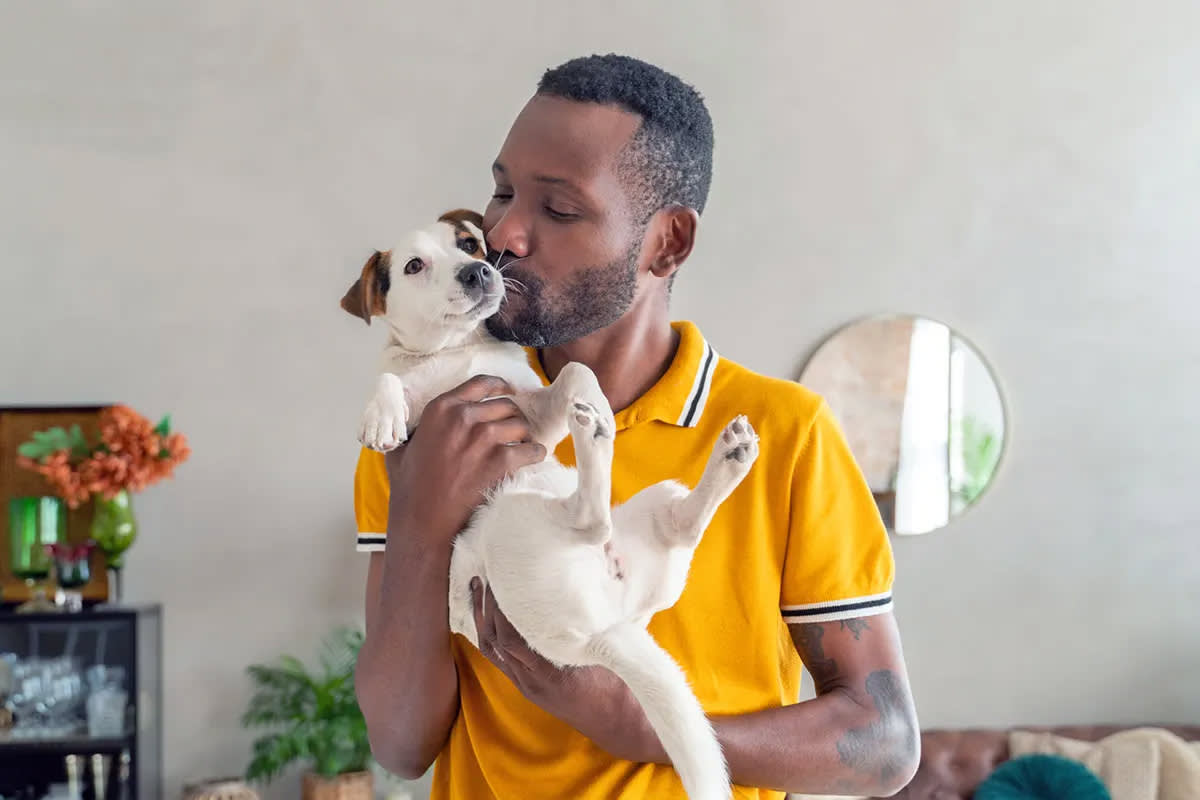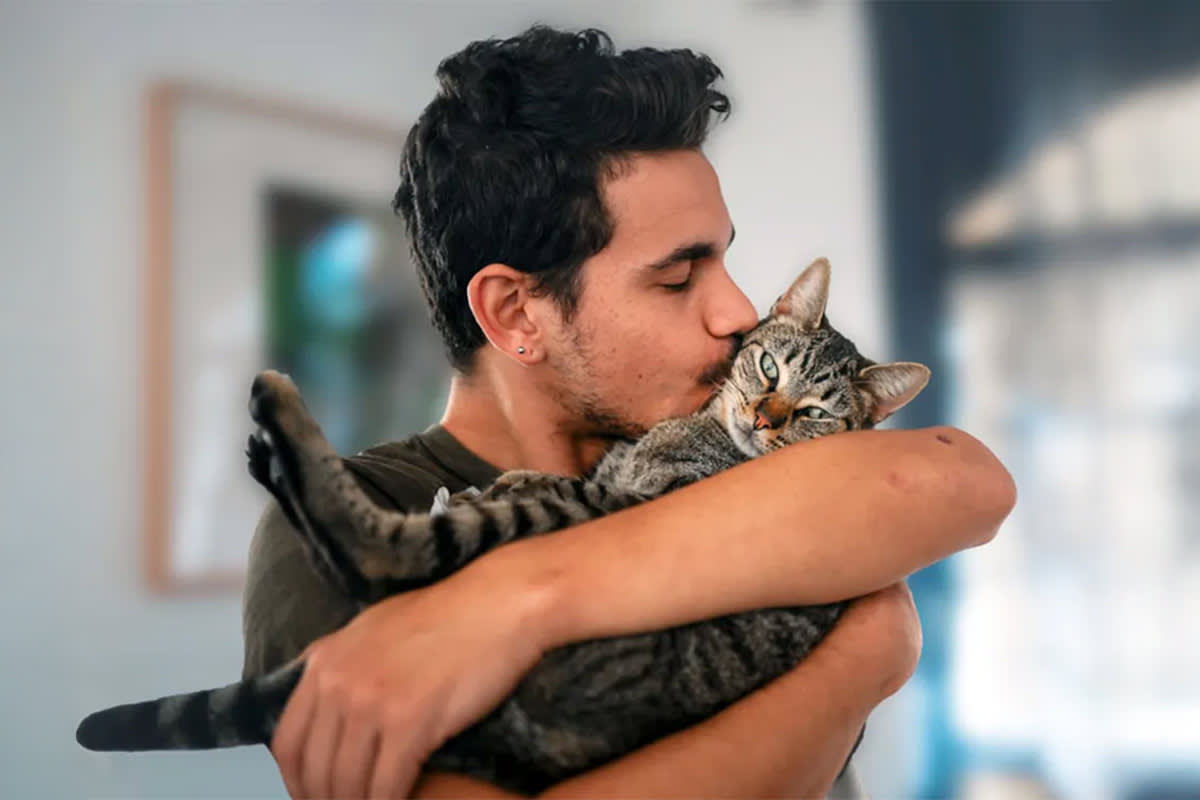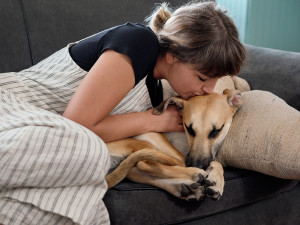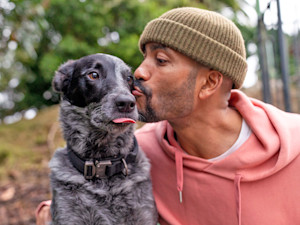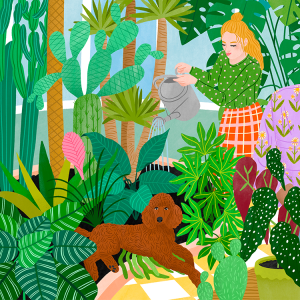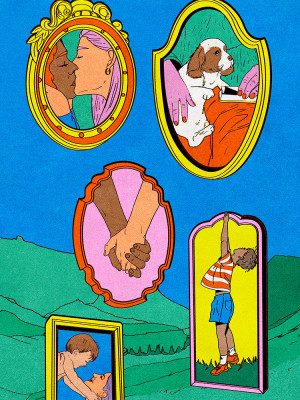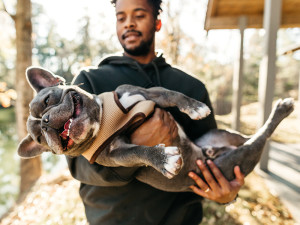Are Dog Moms ‘Real’ Moms? Not Everyone Thinks So
Even as more people choose to have pets over kids, they are often still met with criticism.
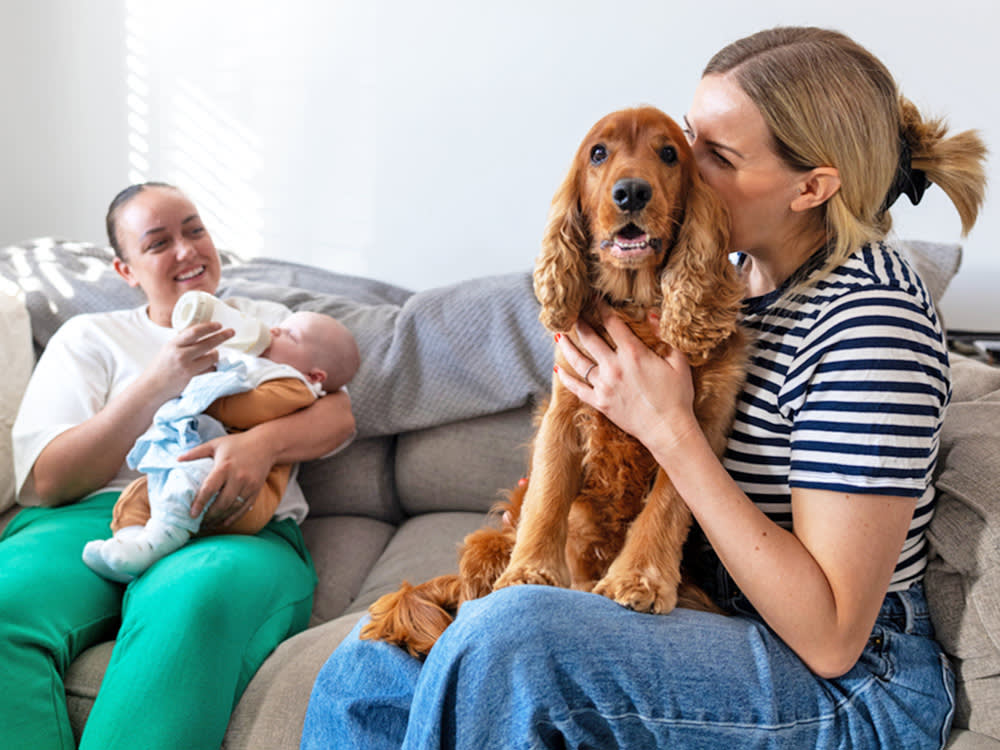
Share Article
Seven years ago, Hilary Weaver, Kinship’s senior editor, got her puppy Georgie and, like many first-time dog parents, she soon realized she was out of her depth. Puppies are cute and all, but they are a lot of work. Like, a lot, a lot. They are energetic and untrained — chaotic even — and they need nearly constant attention. “I was super overwhelmed,” she tells me, recounting the memory that’s still fresh in her mind. “I had to start thinking differently and living differently and every time we left the house I had to make sure she had all her accessories, her pills, her toys. It was a lot.”
One day, Weaver made a casual comment to a coworker that taking care of Georgie was “like having a baby.”
The coworker frowned. She had kids of her own and seemed offended by Weaver’s statement. “No, it’s not,” she said. Then she walked away.
This blunt dismissal hurt Weaver. “I was so embarrassed,” she says. “I wasn’t saying Georgie was a baby, but she was the closest I had come at that point, and [caring for her] was a lot.”

There is an understandable disconnect here.
Weaver’s experience is not uncommon among pet parents. Whether they have chosen to be temporarily child-free (as was Weaver’s case when she first adopted Georgie) or child-free for life, the love and devotion they show their pets, not to mention the effort they put into caring for them, can be devalued or wholly disregarded by those who have chosen differently.
“People are so caught off guard when I do things for my cats that they might do for their human kids,” says Anna Tripolitis, cat mom to Fleur and Tula. “For example, every year my girls and I do a full-on photoshoot for our holiday card. I write their names and ages and will sometimes even give updates on their interests and life events. When I tell people this, they usually laugh and tell me I’m ridiculous.”
International cargo pilot Robbie Barnhart doesn’t currently have pets of his own — his schedule and lack of a partner make it impossible for him to give pets the care and consistency they need — but he is a devoted godparent to the pets of his friends.
“I flew across the country to petsit my friend’s dog when she was covering the royal wedding, and I ask for updates on my godpets daily,” he says. Still, he often feels judged and misunderstood by people who have chosen to have kids. “When I worked for a passenger airline, the question of kids would often come up with my coworkers. A flight attendant asked me if I had kids, and I said, ‘No. I don’t want them. Only dogs.’ And she said, ‘Oh, you’ll change your mind when you get older,’ but that is not true for me; I’ve stood firm in my convictions for nearly a decade now.”
Often, people who have chosen to have kids act as if the shift from wanting to care for a pet to wanting to care for a child is inevitable, but it’s not. “I’m engaged and getting married next year,” says Lauren Dixon, pet mom to calico cat Sookie and Cattle Dog mix Spider-Man. “With that, comes a lot of questions or assumptions about kids being the next step in my relationship, but my fiancée and I are very happy with our animals and feel fulfilled. We’ve made it very clear that kids are not in our plan, but one family member in particular keeps bringing it up. For me, my pets are my kids, and it’s frustrating to feel like others don’t see it that way.”
At times, it can even feel like there is open hostility towards those who have chosen pets over kids. Especially if they dare to refer to their pets as their children. Even when they do this in a casual, analogous sort of way — like Weaver did with her coworker — it can often feel like their word choice and their life choice is being treated like an affront to the very institution of parenthood and the people who have chosen to enter into it.
After Barnhart told the flight attendant he didn’t ever want kids, she became unable to talk about anything else. “From that point, it became her prerogative to defend her choice to have children — when I didn’t care or ask,” he says. And yet, she continued to push the issue, as if she needed him to want kids in order to feel confident and secure in her own decision to have them. “She’d tell me: ‘They’ll break your heart, but it’s so worth it.’ and I was like, ‘Sounds miserable to me, Shelly.’”
According to Cheryl Groskopfopens in new tab, a dual-licensed marriage and family therapist and professional clinical counselor at Evolution to Healing Psychotherapy in Los Angeles, Barnhart seemed to have a pretty accurate understanding of what was going on in that interaction. “A lot of parents — not all, but a lot — have wrapped their entire self-worth and purpose into the experience of raising human kids,” Groskopf says. It’s the most all-consuming role they’ve ever had — physically, emotionally, and financially.”
She continues: “So, when someone casually says, ‘My dog is like my child,’ it can hit a nerve. Not because the person hearing that hates dogs. But because part of their brain interprets it as, ‘You’re not that special.’ Or worse, ‘That brutal, life-altering sacrifice you made? I can get that same feeling just by adopting a rescue.’”
That’s not what pet parents are saying, though. It’s certainly not what Weaver was saying. She was simply trying to express her genuine love for her dog and her struggle with the adjustment to puppy parenthood. And the fact that her coworker appeared to take offense at that says more about that coworker than it does about her. Still, it’s hard to feel like your emotions and struggles are not honored by those around you.
Of course, it’s very possible that Weaver’s coworker was feeling the same way she made Weaver feel. Maybe she was also overwhelmed. Maybe listening to someone complain about her dog, however mildly, felt like listening to someone whine about a splinter in her finger when she was walking around with an axe in her back.
People with kids definitely feel the stress.
Parents often feel overworked and like they can’t meet expectations. A March 2025 pollopens in new tab from Talker Research found that 53 percent of parents find it “impossible to measure up to the ‘perfect’ parents they see on social media.” In addition, 94 percent of parents said they experience “an average of seven instances of chaos on a daily basis.” It can be an exhausting job, and it’s really no wonder that so many people are opting out of it these days.
On the other hand, someone choosing not to have children may be especially triggering for someone who maybe felt like they had no choice in the matter themselves.
Maybe they felt pressured to have kids by their partner, their family, a doctor who told them they were running out of time, or society at large. Maybe it never really occurred to them that not having children was even an option. So, when they see someone making a choice they feel they were denied, they feel resentful. Or maybe they just wish they had a break sometimes. Even if they love their kids. Even if they wouldn’t want to trade places with that child-free person in a million years.
This issue goes a lot deeper than what’s at the surface.
In either case, it’s not really about kids versus pets. “It’s about belonging and identity and the need to have one’s life choices validated in a society that often sets narrow expectations for what fulfillment should look like,” says Jessica Tateopens in new tab, chief clinical officer at Milton Recovery in Palm Beach, Florida. “The fact is, we live in a culture where the traditional path — partner, children, the nuclear family — is still upheld as the default measure of adulthood and success. Those who pursue alternative forms of connection, such as being a devoted pet parent, are sometimes perceived as deviating from that script.”
And that can be especially upsetting for people who chose not to deviate and now have unresolved or unexamined regrets and resentments around that decision.
But just because you are triggered by someone, doesn’t mean they are doing something wrong. There is a tendency in our culture to blame others for the way we are feeling and to say, “I’m uncomfortable, and it’s your fault.” And while it may be comforting to shift the blame for your hurt to someone else, it doesn’t address the real issue, which is whatever feelings, memories, or conflicts that moment of discomfort brought up for you. “That’s where the healing work needs to be done,” Groskopf says.
She adds that if you want to actually move through these feelings, you need to zoom out. “For parents of kids: Notice if you’re feeling unseen, exhausted, or like nobody appreciates the weight of what you carry.” That’s real. But it doesn’t mean others are minimizing it; they’re just having a different experience.
Groskopf advises anyone who feels judgmental toward a child-free pet parent to observe their own hangups first. In this instance, she says, just realizing ”‘this isn’t actually about [the pet parent] — it’s about what this stirred up in me’ is enough to lower the temperature.”
Operate with curiosity and empathy.
If you are close with the person who is judging you and feel the need to discuss the issue further, try to approach that interaction with curiosity rather than defensiveness. Ask questions and state your case without trying to convince them of its superiority. “It is OK for us to have different values,” says Ashley Frenchopens in new tab, a licensed professional counselor at Denver Therapy in Denver. “Remember that the decision to have children or not, to have pets or not, is a reflection of our own desires and circumstances, not an attack on someone else’s choices.”
It’s also worth remembering that not all people who have pets instead of children do so by choice. “Sometimes, pet parents want to be human parents but have trouble conceiving or cannot conceive, have lost a child, or feel they do not have the financial resources to parent well,” French says. “And in these cases, rejection and being seen as ‘less than’ by parents with human kids can feel especially painful.”
This is certainly the case for Weaver, who has been struggling with infertility for two years. “Being a dog parent is a salve while my partner and I are going through this process, which has been so painful, frustrating, and expensive,” she says. “I know it’s not exactly the same as having a kid, but it’s what I’ve got right now, and it’s not for lack of trying.”
And if, after all this, you’re still feeling hurt by someone else’s response to your choices, walk away. That may be easier said than done, but you cannot change another person. You can only change yourself, and protect your peace. “It’s not worth interacting if one or both parties demonstrate an inability to accept that other adults made a different decision, or if they are just shaming one another. This behavior doesn’t demonstrate a willingness to understand, just a desire to win,” French says.
Plus, Kroskopf, says, you don’t have to make a “dramatic exit” from the interaction: “Just a shift. Pull back. Respond less. Give short, kind replies. You’re allowed to disengage without announcing it. And if you want to name it before stepping away, say something like: ‘I think we see this really differently, and that’s OK. I just don’t think these conversations feel good for either of us.’ That’s it. You’re not trying to win. You’re protecting your nervous system. And that’s the real work, anyway.”

Charles Manning
Charles Manning is an actor and writer based in New York City. In his free time he likes to cook, go swimming at the public pool, volunteer at the LGBTQ senior center, and foster senior and special-needs cats. His work has previously appeared in Cosmopolitan, Elle, Marie Claire, Harper’s Bazaar, Seventeen, and Nylon.
Related articles
![A woman kissing her dog on a couch.]()
Millennials Are Choosing Pets Over Kids, Study Finds
A study found that millennials are choosing pets over kids. Here’s why.
![Valentin Pujadas illustration]()
FYI, Pets Are Incredibly Good For Your Mental Health
Experts share the science-backed ways our pets offer us emotional support.
![Man kissing his black and white dog outside in the woods.]()
Younger People Are More Likely to View Their Pets as Children, New Study Finds
Bring out the puppy strollers.
![Bodil Jane illustration, someone waters a garden with a brown dog in it]()
Nature vs. Nurture: Does Your Parenting Style Influence Your Pet’s Behavior?
Your personality may actually have something to do with your pet’s personality.
![an illustration of a couple kissing, a dog, a couple holding hands, a child, and a child playing with a dog]()
Is Raising a Dog With Someone Anything Like Raising a Kid Together?
It’s the great puppy versus baby debate.
![An African American Man Holding His French Bulldog.]()
The Kids Are Alright
And by kids, I mean pets.
